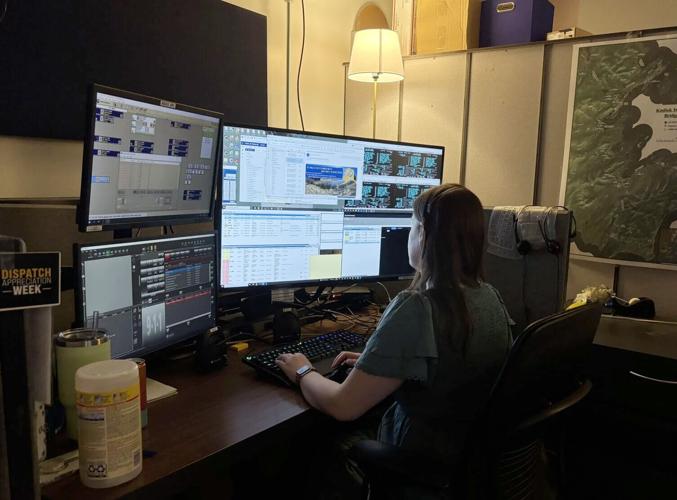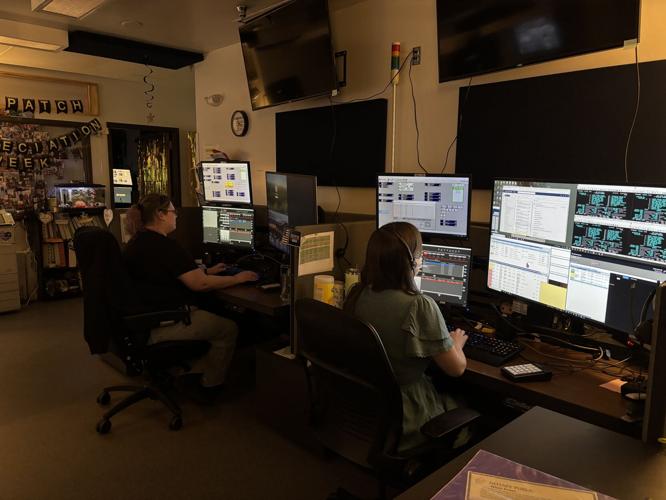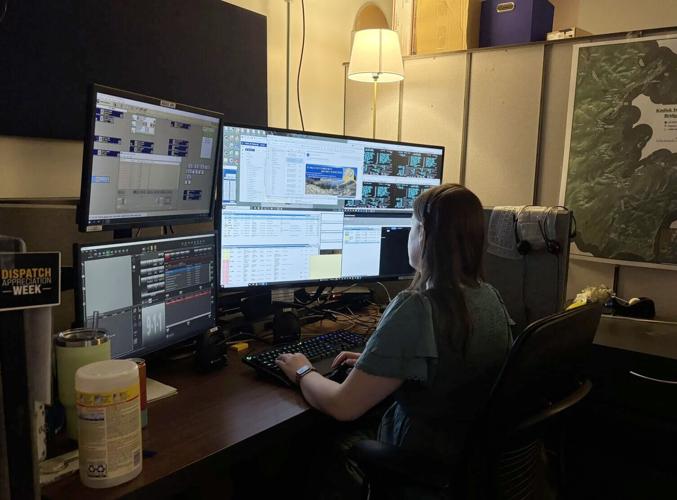At the Northern Dispatch Center, decorations, snacks, and flowers filled the space during the second week of April to celebrate National Public Safety Telecommunicators Week.
“It’s the Valentine’s Day of dispatchers,” said Rhonda Phillips, emergency dispatch supervisor, on April 14.
Phillips worked for Mat-Com Dispatch in Wasilla for 17 years before transferring to the Northern Dispatch Center in June 2024.
The center, located in the Alaska State Trooper post on Peger Road, provides dispatch services for Interior Alaska, Western Alaska and portions of the Kenai Peninsula. Meanwhile, the Fairbanks Emergency Communications Center, located within the Fairbanks Police Department, dispatches for 22 agencies in the Fairbanks North Star Borough, Denali Borough, Delta Junction, and Nenana.
Phillips, who has family members in law enforcement, grew up watching shows like “Rescue 911.” While in college, she was looking for a job, noticed that dispatchers were well-paid, and never looked back. “It’s just a phenomenal field to be in,” she said.
When the News-Miner shadowed dispatchers on April 14, they were fielding calls about trespassing, a runaway juvenile in downtown Fairbanks, a flat tire on the Parks Highway, suspicious activity in North Pole, alleged child sexual abuse in Ketchikan, and traffic stops across the state. One woman reported that there was “something weird going on next door.”
“We are getting slammed,” one dispatcher said.
Missy Evans, who has been an emergency services dispatcher for four and a half years, said she enjoys the fast pace.
“I love being busy. I like when we’re in a rush and we have a lot of calls coming in,” she said.
Originally from Washington, Evans worked seasonally at Denali National Park, where she fell in love with Alaska. She moved to the Fairbanks area in 2014.
“Growing up, I wanted to be an actual police officer, however I don’t run so that was not an option for me. This was the next closest thing,” Evans said.
The Northern Dispatch Center is alive with constant noise: ringing and dinging, clacking keyboards, and dispatchers speaking into headsets. According to Phillips, the ringing alerts dispatchers to 911 calls, while the dinging reminds them to check in with troopers during patrols or active calls every three to five minutes.
“You hear it in your sleep,” Phillips said of the dinging.
On April 14, Evans managed calls and monitored radio traffic for Tok, Delta, Fairbanks, and the Parks Highway. She used the Alaska Public Safety Information Network and the National Crime Information Center to check license plates and driver’s licenses, which show if plates are valid, whether the registered owner has warrants, and if they have a history of hostility toward law enforcement.
“We want to make sure that we are preparing them to go into a dangerous situation regardless of whether it’s going to be dangerous or not. My goal every time I come in for my job is to make sure each and every one of these guys, they’re coming home to their families and not in a body bag.”
Phillips acknowledged the emotional toll the work can take.
“All the things that make you really good at being a dispatcher make it really hard to interact well with society,” she said. “To be a really good dispatcher you have to be good at juggling a lot of things at once. You have to be able to get information and get it quickly. You have to be very short and concise and have a really good bullshit meter.”
After 15 years on the dispatch floor in Wasilla, Phillips knew it was time to move into management.
“It’s really hard on you. It does take an emotional toll on you,” she said. “Unfortunately, the memorable ones (calls) are the ones you would like to forget and can’t.”
Now in a supervisory role, Phillips focuses on supporting her team. She encourages dispatchers to prioritize mental health, get enough sleep, eat well, and pursue certifications through the National Emergency Management Association.
For Evans, few calls have left lasting marks.
“It’s very easy for me to not attach myself to a call and think about it a lot. I can very easily detach myself from this and I don’t take it home with me,” she said. However, calls involving children are the most difficult, she added. She finds peace through fishing and spending time with family.
Staying calm is essential.
“I tell myself to not let it affect you because you need to be there for that next person having a crisis and having the most horrible day of their lives, it’s not about you it’s about them,” Evans said.
Staffing shortages are a nationwide issue, and the Northern Dispatch Center is no exception.
“It’s one of those things that you either love it and you stay for a very long time or it burns you out really quick and you move on,” Phillips said.
The center currently operates with about half the staff it needs.
“Being understaffed definitely does make it a bit challenging because you’re doing the job of two people,” Evans said.
Still, Evans said the team works well together.
“What one person isn’t the strongest in another person in the room is, so it’s kind of like a puzzle,” she said.



